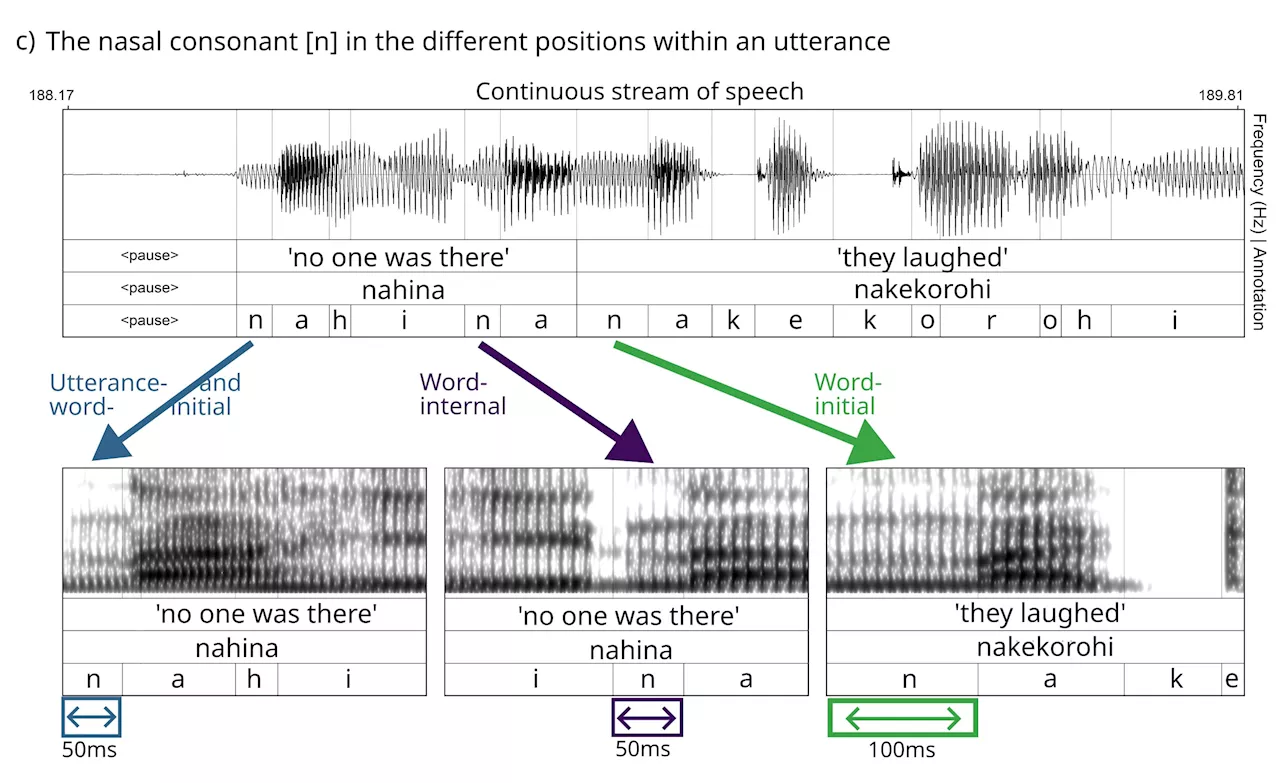A new study by linguists suggests that word-initial consonants are, on average, around 13 milliseconds longer than their non-initial counterparts across a diverse sample of languages. This finding may be a key factor in speech perception and how humans distinguish the beginning of words.
Speech consists of a continuous stream of acoustic signals, yet humans can segment words from each other with astonishing precision and speed. To find out how this is possible, a team of linguists has analysed durations of consonants at different positions in words and utterances across a diverse sample of languages. They have found that word-initial consonants are, on average, around 13 milliseconds longer than their non-initial counterparts.
Distinguishing between words is one of the most difficult tasks in decoding spoken language. Yet humans do it effortlessly -- even when languages do not seem to clearly mark where one word ends and the next begins. The acoustic cues that aid this process are poorly understood and understudied for the vast majority of the world's languages.
The authors conclude that lengthening may be one of several factors that help listeners identify word boundaries and thus segment speech into distinct words -- along with other factors, such as articulatory strengthening, which has not been comparatively studied in detail so far. In the current study, some languages additionally showed evidence of a shortening effect following pauses at the beginning utterance.
Researchers have found that languages around the world have words for 'this' and 'that'. The 45-strong international team studied 29 languages from around the world including ...
Speechperception Linguistics Languages Consonants Wordsegmentation
United States Latest News, United States Headlines
Similar News:You can also read news stories similar to this one that we have collected from other news sources.
 New study shows that word-initial consonants are systematically lengthened across diverse languagesA new study published in the journal *Language* reveals that word-initial consonants tend to be systematically lengthened across a wide range of languages. This finding challenges previous assumptions about consonant length and offers insights into the universal principles governing speech sound production.
New study shows that word-initial consonants are systematically lengthened across diverse languagesA new study published in the journal *Language* reveals that word-initial consonants tend to be systematically lengthened across a wide range of languages. This finding challenges previous assumptions about consonant length and offers insights into the universal principles governing speech sound production.
Read more »
 Having access to a word can help us recognize our experience of that word.Having access to a word can help us recognize our experience of that word.
Having access to a word can help us recognize our experience of that word.Having access to a word can help us recognize our experience of that word.
Read more »
 Study Says Mom Was Right: Eat Your Vegetables to Live LongerA new study reveals that while plant-based fats found in grains, oils, fruits, and veggies decrease the risk of death, animal-based fats in meat, dairy, and eggs increase them.
Study Says Mom Was Right: Eat Your Vegetables to Live LongerA new study reveals that while plant-based fats found in grains, oils, fruits, and veggies decrease the risk of death, animal-based fats in meat, dairy, and eggs increase them.
Read more »
 Sleeping longer on weekends could lower heart disease risk by 20%, study findsA new study found that people who catch up on more sleep during the weekend can have a 20% decreased risk of heart disease. Dr. Marc Siegel of New York commented on the findings.
Sleeping longer on weekends could lower heart disease risk by 20%, study findsA new study found that people who catch up on more sleep during the weekend can have a 20% decreased risk of heart disease. Dr. Marc Siegel of New York commented on the findings.
Read more »
 Flexibility Could Help You Live Longer, New Study ShowsSince becoming a freelance writer in 2019, Emily has developed significant experience covering viral pop culture moments and trending news topics in the health and wellness space, while also writing about mental health, relationships, and smarter living.
Flexibility Could Help You Live Longer, New Study ShowsSince becoming a freelance writer in 2019, Emily has developed significant experience covering viral pop culture moments and trending news topics in the health and wellness space, while also writing about mental health, relationships, and smarter living.
Read more »
 Cutting Down on Folate Can Help You Live Longer, New Study SaysSince becoming a freelance writer in 2019, Emily has developed significant experience covering viral pop culture moments and trending news topics in the health and wellness space, while also writing about mental health, relationships, and smarter living.
Cutting Down on Folate Can Help You Live Longer, New Study SaysSince becoming a freelance writer in 2019, Emily has developed significant experience covering viral pop culture moments and trending news topics in the health and wellness space, while also writing about mental health, relationships, and smarter living.
Read more »
